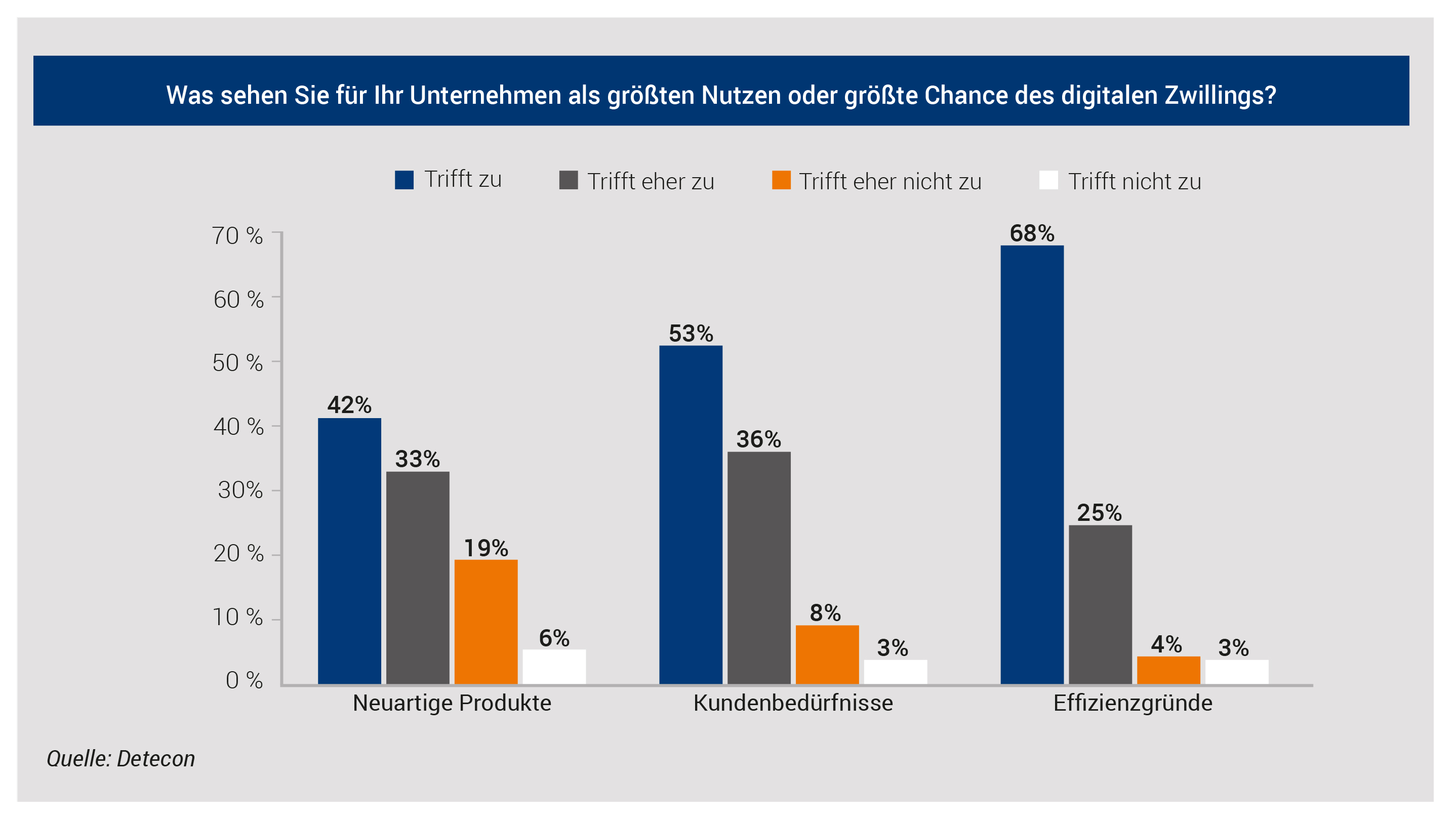Media Information
Detecon Study: Companies Create Deployment Concepts for Digital Twin
Vielfältige Potentiale über gesamten Lebenszyklus
Unternehmensübergreifender Einsatz besonders erfolgversprechend
Fehlendes Know-how und unzureichende Standardisierung als größte Hürden
Cologne, October 10, 2019 - 36 percent of German companies and organizations have already developed initial concepts for digital twins. Fifty percent want to launch associated pilot projects in the next twelve months, whereas the transfer to ongoing operations will only take place in three years for over 50 percent of those surveyed. These are the findings of the current study "Digital twins. Paving the way for ecosystems of tomorrow", which the management consultancy Detecon conducted in cooperation with the Cross-Business-Architecture Lab e.V. user association. (CBA Lab) has conducted.
The goal of the digitization concept of digital twins is to virtually reproduce the current state of products, systems, and processes as completely as possible and to simulate future behavior in order to make business-relevant decisions at an early stage.
Ideally, this should be done throughout the entire lifecycle of a product: at least 60 percent of the study participants intend to apply the concept to all phases such as product conception, development, production planning, production as well as use and after-sales in the next 5 years. "At a high level of sophistication, the Digital Twin even provides feedback directly to its physical brother, forming a self-improving AI system. The key to providing relevant information in a timely and secure manner lies in holistic information management," emphasizes Uwe Weber, head of the Industrial IoT Center at Detecon.
Digital ecosystems as a success factor
Particularly high potential is expected for cross-company ecosystems. While today just under 80 percent of those surveyed still use the digital twin only internally within the company, the picture is expected to be reversed in 5 years: 77 percent want to use the digital twin primarily across companies.
"This seems logical, because a smart city, for example, with all its embedded IoT scenarios such as intermodal mobility and digital building and energy management, can only be comprehensively successful if previously closed individual systems comprising processes and IT solutions grow together to form ecosystems on suitable platform architectures," explains Uwe Weber. "For this, however, it is necessary to open up rigid structures and dissolve boundaries. Silo-based approaches will hardly survive."

Users see advantages, but also challenges
When asked about the specific benefits of a digital twin, over 90% of participants cited efficiency reasons. Only just under 7 percent expect hardly any efficiency gains. Nearly 90 percent also expect customer needs to be better met, and 75 percent trust the digital twin to facilitate the development of new types of products. "The hope in terms of efficiency is to be able to identify potential errors at an early stage, for example in planning and design, and to optimize process flows. New products, but also business models and even partnerships, can thus be tested digitally without having to set them up in reality at great expense," explains Hendrik Grosser, IoT expert at Detecon and co-author of the study.
Accordingly, a total of 92 percent of the survey participants also believe that there is generally a great opportunity in the use of the digital twin. Opinions are completely divided, however, on the question of whether the new digitization concept also brings with it the danger of disruption in relation to one's own company. Fifty percent of respondents answered in the affirmative and 50 percent in the negative, respectively, about such a possible threat from the digital twin.
When asked about the greatest technological and organizational challenges in implementation, 78 percent of companies lack expertise in the implementation of digital twins. 75 percent complain about insufficient standardization and 73 percent have not yet identified a suitable business model. 69 percent have an inadequate IT infrastructure and 54 percent find external IT structures inadequate. Data security seems to be the smallest problem or is underestimated the most: Only 48 percent consider this to be a challenge.
The German-language study "Digital Twins. Paving the way for ecosystems of tomorrow" is available for download here.
Your Contact


